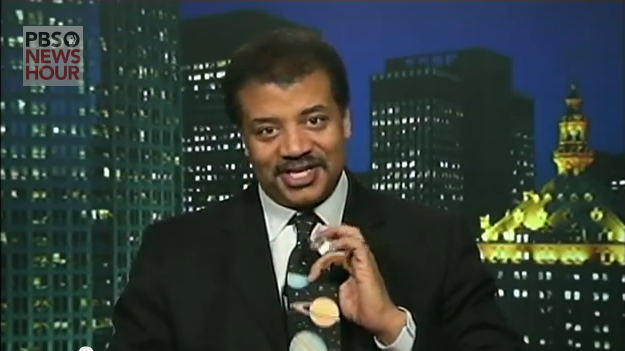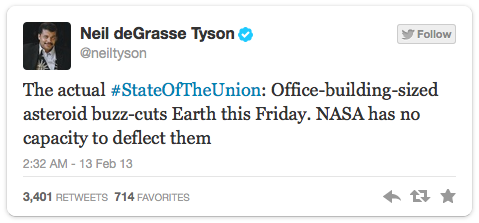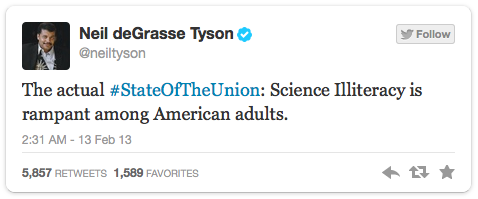February 19, 2013 10:09 pm
Asteroids, Meteors, Meteorites… What’s the Difference?

Astrophysicist Neil deGrasse Tyson gives a short astronomy lesson on “Asteroids 101” with the help of his solar system tie during an appearance on the PBS NewsHour.
Last Friday, February 15th, 2013, as much of the world prepared to breathe a sigh of relief as asteroid 2012 DA14 flew past Earth at a distance 5,000 miles closer than our orbiting communications satellites, there were many people who were afraid that somehow all our calculations were somehow wrong, and that the asteroid would instead crash into earth, destroying all life as we know it, or at least, setting up the survivalist-predicted doom that would make regular viewers of Doomsday Preppers stand up and shout, in their best Tim the Enchanter voice, “I warned you!”
Which is exactly what they did when they found out that, at 9:30 am local time, a meteor estimated to be approximately 7000-8000 tons exploded in the sky over Chelaybinsk, Russia.
To the scientifically illiterate, the two events were obviously related. Having seen Armageddon, the movie where NASA sends Bruce Willis and an intrepid band of misfit drillers into space to save the world from certain annihilation, everyone knows that before the big asteroid hits, little, faster moving pieces break off and hit various parts of our planet first.
The connective tissue of the two events was aided by “journalism” that continually asked if the two events were related in concerned tones and kept, either deliberately or unintentionally, confusing the words asteroid, meteor, and meteorite.
If you’re a StarTalk Radio fan, you know exactly what I’m talking about, because, in all likelihood, it fell to you to calm the fears of friends, relatives, and co-workers and reassure them that the sky, in fact, was not falling.
Because the first thing you did when you heard that a meteor hit Russia was search for data. You remembered that the asteroid wasn’t due to reach its closest point to Earth until 2:00 PM ET, so you knew something didn’t add up. You probably went online, where you quickly found that the meteor came from a different direction than the asteroid. Maybe you went to Twitter, where people like @BadAstronomer Phil Plait and @starstryder Dr. Pamela L. Gay were tweeting the facts as they were discovered, or even went to #RussianMeteor where actual videos and more facts were being tweeted.
Or maybe you turned on the TV and saw astrophysicist Neil deGrasse Tyson explain what happened on TODAY on NBC.
http://www.youtube.com/watch?v=gcRWpfQljhY
But what you didn’t do was add to the hysteria.
There is reason to be concerned, but not hysterical. As @neiltyson tweeted a few days before, after President Obama’s State of the Union address:
But the more important reason to be concerned may just be:
That’s it for now. Keep Looking Up!
–Jeffrey Simons
Get the most out of StarTalk!
Ad-Free Audio Downloads
Priority Cosmic Queries
Patreon Exclusive AMAs
Signed Books from Neil
Live Streams with Neil
Learn the Meaning of Life
...and much more



 Become a Patron
Become a Patron

